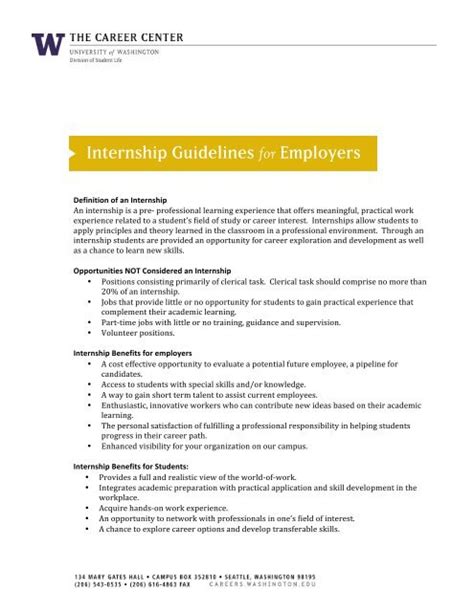Introduction
Paid internships have become increasingly popular in recent years, offering students valuable hands-on experience and employers access to a pool of highly motivated and talented individuals. However, it is essential for employers to establish clear guidelines to ensure that paid internships are mutually beneficial and compliant with labor laws. These guidelines should address various aspects, including compensation, eligibility, training, and evaluation.

Compensation
According to the National Association of Colleges and Employers (NACE), the average hourly wage for paid interns in 2023 was $24.58. However, compensation may vary depending on factors such as the industry, location, and experience level of the intern. Employers should establish a fair and competitive compensation package that is commensurate with the intern’s skills and responsibilities.
Eligibility
Eligibility criteria for paid internships should be clearly defined. Employers may require interns to meet certain educational qualifications, such as being enrolled in a specific degree program or having a certain GPA. They may also stipulate minimum age requirements or limit the number of interns they hire per semester or year.
Training
Employers are responsible for providing interns with adequate training and supervision. This training should cover the intern’s job duties, safety procedures, and company policies. Mentorship programs can also be beneficial, pairing interns with experienced employees who can provide guidance and support.
Evaluation
Regular evaluations should be conducted to assess the intern’s performance and provide feedback. Employers should establish clear metrics for evaluation, such as specific projects or tasks. Feedback should be specific, constructive, and delivered in a timely manner.
Additional Considerations
In addition to the guidelines outlined above, employers should also consider the following:
- Legal Compliance: Ensure compliance with labor laws and regulations regarding minimum wage, overtime, and employee benefits.
- Diversity and Inclusion: Promote diversity and inclusivity by actively recruiting interns from underrepresented groups.
- Insurance: Provide interns with adequate insurance coverage, including health, dental, and accident insurance.
- Housing: If necessary, assist interns with finding suitable housing or provide relocation assistance.
- Culture: Foster a positive and supportive work culture that values the contributions of interns.
Benefits of Paid Internships
Paid internships provide numerous benefits for both employers and interns. For employers, they offer access to:
- A skilled and motivated workforce
- Innovative ideas and insights
- Potential for long-term employment
- Enhanced employer brand
Interns benefit from:
- Real-world experience and hands-on training
- Professional skill development
- Networking opportunities
- Exploration of career paths
Strategies for Effective Paid Internship Programs
To ensure the success of paid internship programs, employers should implement effective strategies such as:
- Clearly define program objectives and goals
- Establish a structured training and evaluation plan
- Provide opportunities for professional development
- Offer competitive compensation and benefits
- Create a supportive and inclusive work environment
Table 1: Compensation Guidelines for Paid Internships
| Industry | Average Hourly Wage |
|---|---|
| Technology | $28.00 |
| Finance | $25.00 |
| Healthcare | $23.00 |
| Marketing | $22.00 |
| Education | $20.00 |
Table 2: Eligibility Criteria for Paid Internships
| Requirement | Description |
|---|---|
| Education | Enrollment in a relevant degree program |
| GPA | Minimum GPA of 3.0 |
| Age | Minimum age of 18 |
| Experience | Previous relevant experience preferred |
Table 3: Training and Evaluation Plan for Paid Internships
| Training Phase | Objectives | Evaluation Metrics |
|---|---|---|
| Orientation | Familiarize interns with company and workplace policies | Attendance, knowledge tests |
| Job Training | Provide hands-on training in job duties | Completion of projects, accuracy |
| Mentoring | Pair interns with experienced employees for guidance | Regular feedback, performance reviews |
| Evaluation | Conduct regular performance assessments and provide feedback | Completion milestones, quality of work |
Table 4: Strategies for Effective Paid Internship Programs
| Strategy | Description |
|---|---|
| Define Program Objectives | Establish clear goals and purpose for the internship program |
| Structured Training and Evaluation | Develop a comprehensive training plan and schedule regular evaluations |
| Professional Development | Offer opportunities for interns to attend workshops, presentations, and networking events |
| Competitive Compensation and Benefits | Provide fair wages, health insurance, and other employee benefits |
| Supportive Work Environment | Create a welcoming and inclusive culture that values inter |
